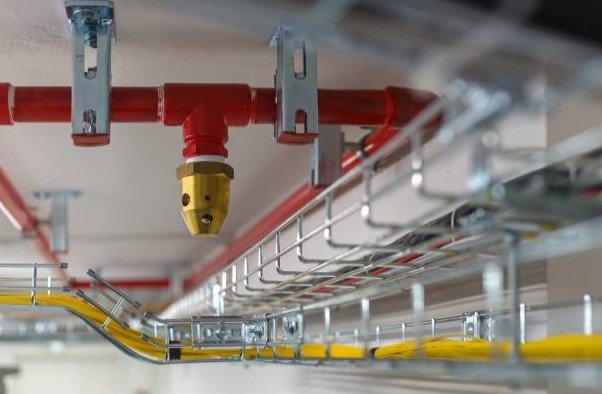What Factors Should You Consider When Choosing a Fire Suppression System?

Regarding the protection of life, property, and key assets, fire suppression systems are instrumental in stopping fire damage and providing safety. The right choice of fire suppression system is essential no matter whether you are guarding a commercial building, an industrial site, or a residence. The proper system will shield, aid and save lives as well as bringing about shareholder losses. Conversely, you might encounter a dilemma in choosing the right one that fits your specifications with so many options in the market.
Here, we will analyze the critical factors to reflect on when selecting a fire suppression system, making sure you will be able to make an appropriate choice regarding the best fire suppression method for optimal protection.
1. Type of Facility and its Specific Risks
A major factor to weigh in while selecting a fire suppression system is the kind of facility to be covered and its corresponding particular risks. Varied facility types offer distinct fire hazards, and hence, different fire suppression systems are designed for certain environments only. E.g.:
– Data Centers and Server Rooms: These are the places where typically state-of-the-art electronics are housed, making them easy targets of being set on fire due to reasons like overheating or electrical faults. An interruption to these operations typically results in lost revenues, and as such clean agent fire suppression systems like FM-200 or Inergen are highly advisable. The use of these agents, which basically cut out moisture, hence, do not leave residues is one of the many advantages they have in this type of application.
– Industrial or Manufacturing Sites: Factories, warehouses, or even chemical plants are potentially dealing with risks from combustible materials, liquids as well as possibly dust explosions. Perhaps more fitting would be the applications of wet chemical agents or foam-based fire suppressors to these places as they are specifically made for such unique fire hazards.
– Residential or Office Buildings: For typical commercial or residential spaces, a traditional sprinkler system may be sufficient, as it can handle most common fire types effectively.
So as to pick a correct fire suppression system, the most important should always be the specific environments that create situations conducive to fire, since the wrong one may be unable to suppress the fire or even cause extra damage.
2. Fire Detection and Response Time
The faster a fire gets detected and extinguished, the less damage it will do. When it comes to fires, time should be really paid, especially in cases where expensive equipment or critical data are in the facility. Hence, both detection and suppression speed are significant factors when assessing fire suppression systems.
There are systems that include fire detection technologies that are extremely fast and sensitive like smoke, heat, or gas detectors that will send a signal to the building’s fire suppression system even before the fire would spread into a significant area. They would need to be the first move systems that will put off the flames before it occurs and the place with this type of system would not even notice a loss of service.
Automatic activation is yet another feature that one needs to check carefully. Systems that get triggered without the need for a human being to take any action give out their best in protection, especially at a time when considering dangers where the human eye might not see a place like in data centers or telecommunication devices that can use routers that transform into heat or other electronic environments.Example: When there is a trigger of automatic fire suppression system, the fire can be minimized even if there are no personnel present.
3. Cost Considerations
Price is a core matter of concern when deciding on a fire suppression system however, that shouldn’t be the only factor to decide based on. The initial investment of a fire suppression system can be in a wide range contingent on the specific type of system, the space that is being secured, and the complexity of the installation. Nevertheless, it is not only worth discussing the starting cost but also the advantages in terms of long-term use and the efficiency of the system chosen.
– Installation Costs: A case in point, traditional sprinkler systems, could be cheaper to install than other types like clean agent systems or gas-based suppression systems due to the technology involved.
– Maintenance Costs: All fire suppression systems need to be inspected and serviced on a regular basis to ensure proper operation. The systems that require complex maintenance or that are subject to frequent periodic inspections might incur long-term costs such as higher. Maintenance expenses should be taken into account when reaching your decision.
– Potential Loss Prevention: Adequate fire suppression systems can generate substantial savings when compared to their original costs by saving the company from potentially high fire damages. For very important facilities like data centers or warehouses that keep costly equipment, the costs connected with fire suppression tend to be minimal when you take into account the possible losses connected with fires.
Read also: Anime:8w8a0kawpxi= Roblox Bacon
4. Environmental Impact and Safety
The environmental effect of the fire suppression system you choose is an important consideration, especially in facilities where sustainability is a priority. Some fire suppression agents, like Halon, are ozone-depleting and have been phased out in favor of more environmentally friendly options. Clean agent systems, such as FM-200 or Inergen, offer effective fire suppression without harming the environment. These systems are typically safe for use in occupied spaces and do not leave residue that could damage equipment.
Although one of the safety issues that require careful consideration when making a choice of a fire suppression system is the potential human health risks associated with the agents employed in the system. For instance, some chemical agents may have harmful or toxic effects on individuals in the case of a discharge.
5. Compliance with Regulations
Another key factor to think about is whether the fire suppression system meets the local, state, and national fire safety regulations. Fire codes can vary depending on both the region and the industry; nevertheless, they frequently specify the types of fire protection that must be applied to certain types of facilities or dangers. Complying with these codes should be a primary concern in the decision-making process when choosing the fire suppression system, which would in turn guarantee legal safety.
In addition, some businesses may have specific requirements pertaining to fire suppression beyond those imposed by the government. For example, hospitals and other health care facilities usually have strict rules governing the type of firing protection mechanisms they can implement due to the life-saving potential of such risks. It is of great essence to cooperate with a specialist who is knowledgeable in the matter to ensure the fire suppression system you provide is fully compliant with all the required regulations.
6. Scalability and Future Expansion
When selecting a fire suppression system, it is very crucial to think about the potential for future expansion. A system designed for the current needs might turn obsolete when your facility grows or undergoes transformation. Be it the addition of floors to a building, the integration of more electronics in a data center, or the addition of new materials for a warehouse, a fire suppression system should always be flexible and scalable.
Systems that can readily be attached to what is already in place or be enhanced as required have the benefit of long-lasting flexibility. By selecting a system that is designed for expansion in the future, you could save time and money when the extra coverage is required.
Conclusion
The decision-making process in the quest to select the right fire suppression system is quite complex and involves evaluating various factors. The choice of fire suppression system is primarily determined by the setup of the facility, the specific fire hazards, the speed of the system in responding to the fire, the expected cost, and adherence to regulations. Furthermore, the environmental impact, safety issues, and scalability have to be included in the decision-making process as well. If you set up the right system, only then will it be possible for you to give the premises and business the ability to deal with the unexpected fire-related threats.






